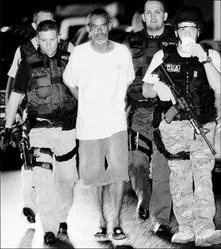POCA: The sleeping giant awakes
Published: Sunday | October 4, 2009

AP
A suspected drug dealer (second left) is arrested by DEA and FBI agents during a raid at a housing project in Bayamon, Puerto Rico, on Friday. With assault rifles slung over their shoulders, agents swarmed the complex where the suspected kingpin, Angel Ayala Vazquez, who was captured last month, grew up and allegedly launched a drug empire that shipped thousands of kilograms of cocaine to the United States mainland.
Less than three years after the Proceeds of Crime Act (POCA) was passed into law, criminals are beginning to feel its bite.
Local authorities have already used the legislation to wrest close to half of a billion dollars in cash out of the hands of wrongdoers.
International data suggest that illegal drugs with a street value of some US$4 billion move from Colombia through the Caribbean into the United States. Much of this pass through the trans-shipment port of Jamaica.
While it is unclear how much of the income from these illegal operations remain in the island, it is assumed that a significant percentage of the money passes through the hands of local criminals. Some seep into the formal economy through money-laundering processes.
Statistics from the Financial Investigations Division (FID) provided through the Ministry of National Security revealed that approximately US$1.36 million ($120.8 million) has been forfeited from criminals, while $329.2 million in raw cash - seven different currencies, including Jamaican dollars - has been seized so far under the POCA.
Just over $75.1 million of that figure has already been sent to the state coffers.
Fight against crime
The data provided by FID also showed that cheques worth some $35 million are to be sent to the Accountant General, while close to half of a million United States dollars in cash and money orders have been forfeited but cannot be negotiated in Jamaica.
FID also noted that property with a value of $1.8 million has been forfeited.
Still, some analysts think that the POCA remains, largely, a sleeping giant in the midst of this national fight against crime. Dr Peter Phillips is one of them.
Chairman of the joint select committee of Parliament which examined the POCA legislation, Dr Phillips, told The Sunday Gleaner that the act is yet to be fully utilised. He believes more could have been accomplished since its inception.
"We haven't maximised the potential benefits ... It would seem to me that we are still in the early phase of using all the powers available under the act," he said.
"It was really designed to ultimately give you a resource, a weapon that could be used to dismantle organised criminal enterprises, and that requires a tremendous exercise of will as well as skill," Phillips added.
Acceptance, on both sides of the political divide, that the two previous pieces of legislation that covered such matters were woefully inadequate led to the crafting and subsequent introduction of the POCA. "The act was enacted to improve the country's capacity to investigate money laundering and confiscate ill-gotten gains.
"This was necessary due to several weaknesses in the then existing Money Laundering Act and the Drugs Offences (Forfeiture of Proceeds) Act," read a section of a response provided by the Financial Investigations Division through the Ministry of National Security.
tyrone.reid@gleanerjm.com.
THE TOP prosecutor in the United Kingdom (UK) says the confiscation of the assets of criminals across the British and Jamaican borders "got off to a slow start", but he is anticipating an acceleration of the process.
"The cooperation is good, but it has to be said that the work on (seizing) the proceeds of crime got off to a slow start," UK Director of Public Prosecutions Keir Starmer told The Sunday Gleaner.
"I anticipate that it now will increase in volume ... in the confiscation of assets, and ... in importance between us. I think things will be moving more rapidly in the future."
Jamaica passed the Proceeds of Crime Act in early 2007. The law gives legislative power to the State to forfeit property and confiscate the proceeds obtained by criminals through drug trafficking money laundering, or other crimes.
Combating terrorism
"We consider Jamaica to be an important partner in our work fighting drugs and corruption, and that's why we are very keen to work here in Jamaica collaboratively," Starmer said in an interview during a visit to the island last week. "So, we see Jamaica as an important partner in the global fight against drugs and corruption."
He disclosed that cases involving Jamaicans trafficking in narcotics by swallowing cocaine pellets, or transporting it in body cavities, "are going down in the UK", although the problem remained high with the influx of illegal drugs from other countries.
The UK's chief prosecutor also welcomed the "high degree of international cooperation" among judicial authorities in combating terrorism. He said the UK has a "specialist counterterrorism division" that collaborated across borders to successfully prosecute the individuals who were plotting to blow up seven aeroplanes in flight from the UK to the United States. "The level of cooperation is very high," Starmer stated.









